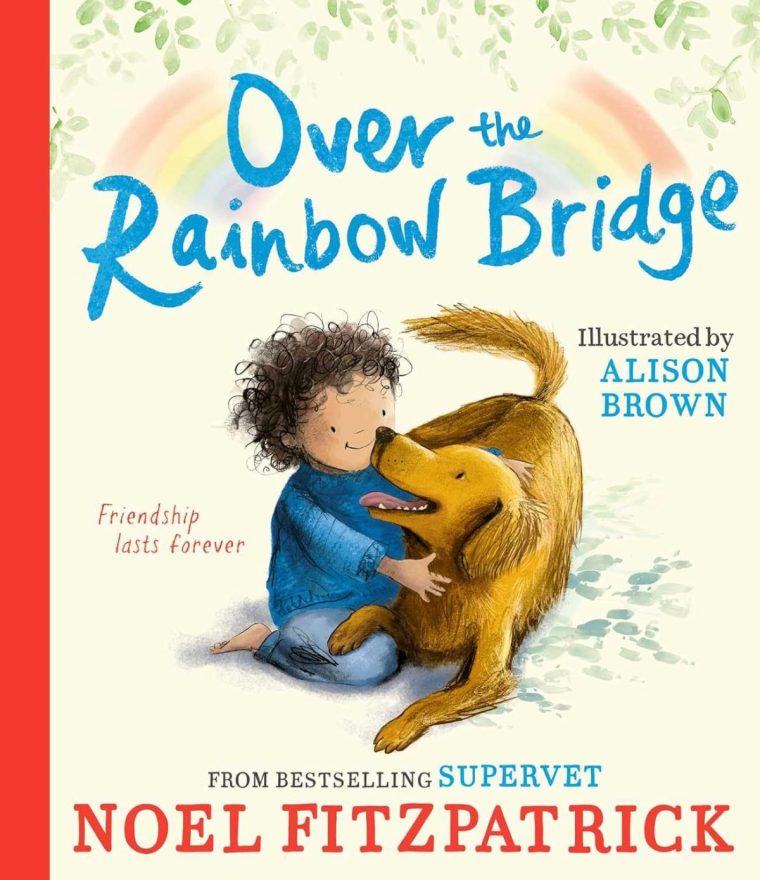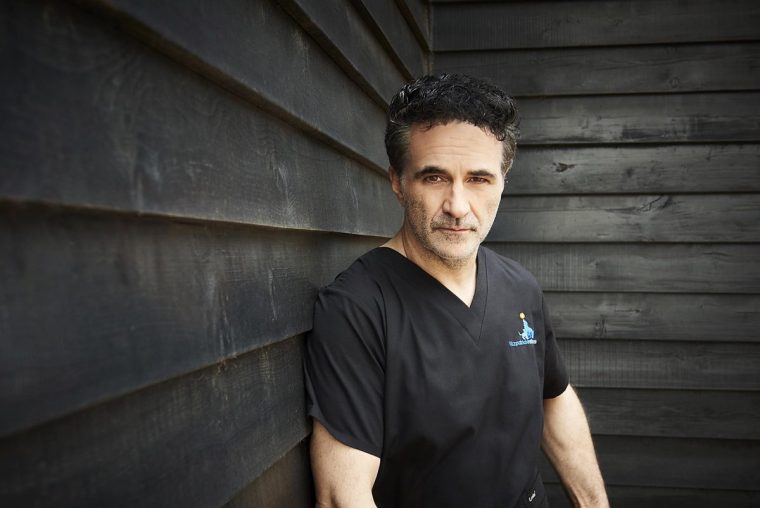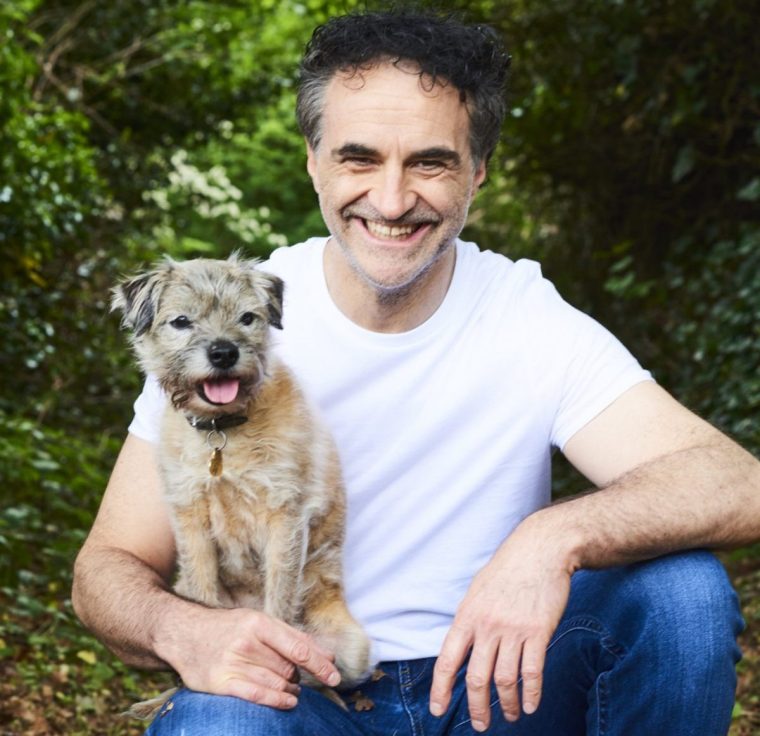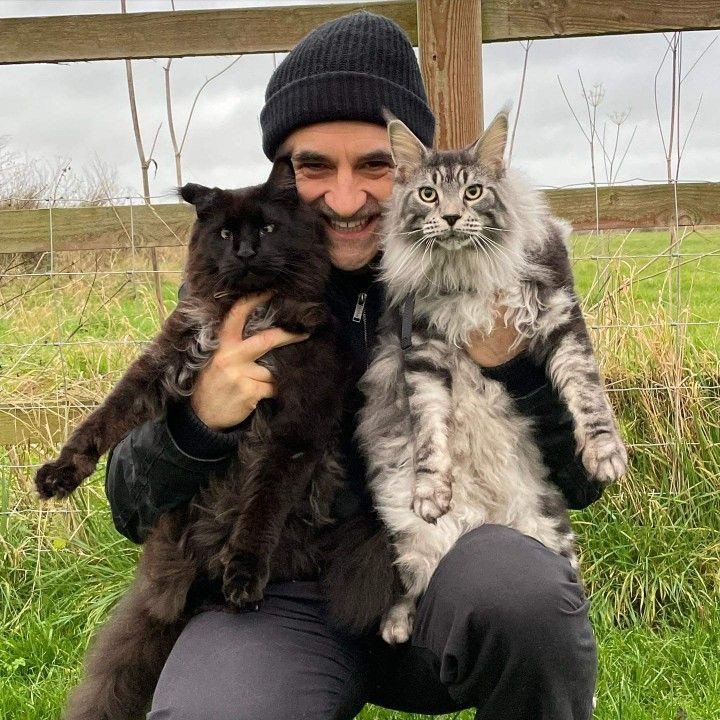It’s three o’clock on a Saturday afternoon, and Noel Fitzpatrick has already had a demanding day in surgery. Sitting before me on Zoom in full scrubs at his veterinary practice in Surrey, he clutches a mug of coffee, and lets out a sigh.
“I’ve just done an operation on a dog’s broken leg, and another patient is in intensive care. It’s not looking good,” he says. “It’s difficult when you’re in the middle of life and death. You’re treading a delicate line between fighting for survival and the ethical dilemma of when to let go.”
Such dilemmas, he adds, “are the decisions that distillate my life. I had to comfort an elderly lady this morning as she let her dog go, and I’d have loved to have given her a copy of my new book, but I didn’t have one on me. I could have photocopied it for her, but she was very distressed.”
The book to which he refers is Over the Rainbow Bridge, about a young child, Sam, and a dog named Dog. “Sam thinks they will go on adventures together for ever,” the blurb goes. “Then the time comes for Dog to go over the Rainbow Bridge.”

The book, no more than two dozen pages long and delightfully illustrated by Alison Brown, is ostensibly for young children, though its message will speak to anyone who has loved a pet, and then let that pet go. Fitzpatrick wrote it, he explains, in the wake of his own dog’s death four years ago – Keira, a Border terrier whom he describes as “my best friend”. He was heartbroken, but, as a veterinary surgeon with 35 years experience, dealing with mortality is simply a part of life.
And a good death is important to the vet that so often administers it.
“Absolutely. People have come back to see me 20 years after I’ve put to sleep their childhood pet to thank me for the context in which I helped with their passing. And that’s the message of this book: that love is for ever, even after the physical being has gone.”
Then he is silent, so that we can both sit with this fact for a moment.
Noel Fitzpatrick is one of the more intriguing public figures of the modern age. In the main, vets do not go on to become famous, or celebrities, much less the kind that can sell out a nationwide arena tour, as he did in 2018. But the 57-year-old is possessed of the kind of maniacal zeal that makes him unusually compelling, while his Dr Doolittle-esque abilities afford him levels of significance that few celebrities could match. His Channel 4 series The Supervet, which ran between 2014 and 2019, made him the nation’s favourite animal doctor.
But this, as we shall see, is only the tip of the iceberg for him. His ambitions have grown.
He was born in Ireland in 1967 within a farming community. As a child, he was sexually abused by one of his father’s farm hands, and later bullied at school, events that coloured how he viewed the world around him. It was when he was 10 years old that he dreamed up a viable future for himself. He would become, he tells me, “Vet Man”.

“It was September 1980, and I was at secondary school. I couldn’t write or read very well, I was stupid, and the only friends I had were animals. The book I was reading, or trying to read, was Oscar Wilde’s De Profundis. When I finally made sense of it, this sentence in particular really hit me – ‘There are cracks in the rocks in which I might hide my tears.’” (The exact quote is: “Nature, whose sweet rains fall on unjust and just alike, will have clefts in the rocks where I may hide, and secret valleys in whose silence I may weep undisturbed.”)
“Wilde was fleeing from something that I couldn’t understand about his life,” continues Fitzpatrick, “but I was fleeing from something, too.”
Becoming “Vet Man” would prove his salvation. Growing up, he was a big fan of music, particularly Led Zeppelin and Black Sabbath, and he found he wanted to harness the, as he puts it, “currency” of rock stars, which he saw as an ability to communicate on a global scale. Fitzpatrick wanted to communicate similarly, and would do so through his own particular medium: animals. In this way he might find his own place within the world.
“You asked me earlier if my career path was deliberate,” he says. (I’d asked him how on Earth a vet becomes a household name, and imagined that it was more by design than happy accident.) “It’s a good question, Nick, no one has ever asked me that before, so well done. Yes, it was super-deliberate. It was after I graduated as a vet that I knew I needed to learn how to communicate on a wide scale.”
He did this, at least initially, on television, with The Supervet, but also through increasingly pioneering surgeries that made him one of the foremost animal doctors in the country, if not the world. In 2009, he became the first veterinary surgeon to successfully apply an amputation prosthesis to a cat that had lost both hind feet in an accident, and was later recognised by the Guinness World Records for it.

He’s now taking his show, Supervet ER, to YouTube, where television increasingly lives these days, so that he can continue to spread his message far and wide. New episodes will screen weekly.
“I can’t change the world for the betterment of animals and humans if I just do one operation at a time,” he says. “I need a broader canvas. See, I’m just a normal bloke but with an astronomically huge sense of empathy with the pain of the world. I feel Gaza, I feel Ukraine, I feel the middle of Africa. I feel the forgotten people in the forgotten wars. And I feel them like a physical pain. That’s why I want to build my communication platform, to help spread love and compassion.”
But wait, there’s more. Encouraged by his friend, Queen guitarist Brian May, he has now formed a group, The Fitzpatrick Band. They are about to release a single called “Love Is Forever”.
“I’m never proud of anything I do, because pride will take a fall. Also, an investiture in the ego doesn’t really help my patients,” he says. “However, I am extremely happy with this song. All the transience of war, materialism, and man’s inhumanity to man could be improved if we actually listen to what makes us most human, and that is love.”

Goodness. Is there anyone else quite like him? A critic might suggest that he’s labouring under a Messiah complex, and perhaps he is. But his mission does seem sincere, and he certainly has a devoted audience.
Google will tell you that Fitzpatrick has never married, but that there have, intermittently, been girlfriends. “And it’s a matter of public knowledge,” he says now, “that I’d like to be a dad.” To this end, he recently told The Times that he finally feels “emotionally ready” to have a family, and would “love to meet a woman in her 30s to have children with”.
This caused swift uproar online and in op-ed pieces – a man of his vintage, approaching 60, in the market for a woman almost half his age with whom to procreate. (The interview ran after our conversation, and when I email his publicist to ask if Fitzpatrick wishes to clarify anything, I’m told he won’t be commenting.)
Still, it seems unlikely his wish will come true any time soon. The reason: his work. He’s married to it, always busy, precious little time off. And here’s the proof: talking to me on a weekend, during his coffee break, in between operations.
“I’m here for one reason only,” he says, “and that’s to try and get all beings on planet Earth to show each other a little more compassion.”
And then he picks up his cat Excalibur for a restorative cuddle, and beams at me with the most extraordinary benevolence.
‘Over the Rainbow Bridge‘ is out now. ‘Supervet ER’ releases new episodes on YouTube every Thursday at 7pm
